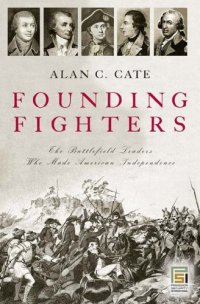
Ebook: Founding Fighters: The Battlefield Leaders Who Made American Independence
Author: Alan C. Cate
- Genre: History
- Series: Praeger Security International
- Year: 2006
- Publisher: Praeger
- Edition: annotated edition
- Language: English
- pdf
American independence was won not just with ideas and words, but also through force of arms. A key element of that battlefield victory was the combat leadership provided by a fierce list of hard-fighting warriors at the regimental, brigade, and division echelons or their naval equivalents. Founding Fighters recounts the stories of fifteen of the American Revolution's most important and colorful battlefield commanders. Collectively, these men participated in virtually all of the war's significant battles and campaigns. They experienced the conflict in all its variants: conventional contest between opposing armies, brutal guerilla struggle between partisans and regulars, frontier and naval fighting, and civil war pitting neighbors, and even family members against each other. These founding fighters helped win stunning victories, knew ignominious defeats, and suffered physical and spiritual privation through times when ultimate victory and independence appeared impossibly remote.
While the Founding Fathers remain eternally popular with the general American reading public, a number of important Revolutionary-era military figures remain much less known (and, in some cases, forgotten). Cate rectifies this. Richard Montgomery, Charles Lee, and Horatio Gates were former British officers who turned from redcoats to rebels, casting their lots with the patriot cause. Henry Knox and Nathanael Greene were self-taught amateurs who shared New England roots and an innate genius for war. Benedict Arnold and John Paul Jones each possessed burning personal ambition and zeal for glory, traits that led one to ignominy and disgrace and the other to immortality as the father of the American Navy. A trio of South Carolinians—Thomas Sumter, Andrew Pickens, and Francis Marion—waged savage partisan warfare in some of the war's darkest days against British occupiers and their Loyalist supporters. Three rough and ready frontiersmen—Ethan Allen, George Rogers Clark, and Daniel Morgan—inspired their followers to important victories. More than a mere examination of battlefield exploits and personalities, however, this book illuminates fascinating aspects of American military and cultural history and offers a superb window for investigating two of the enduring themes of the American military tradition, civil-military relations and the respective roles and worth of professional and citizen soldiers.